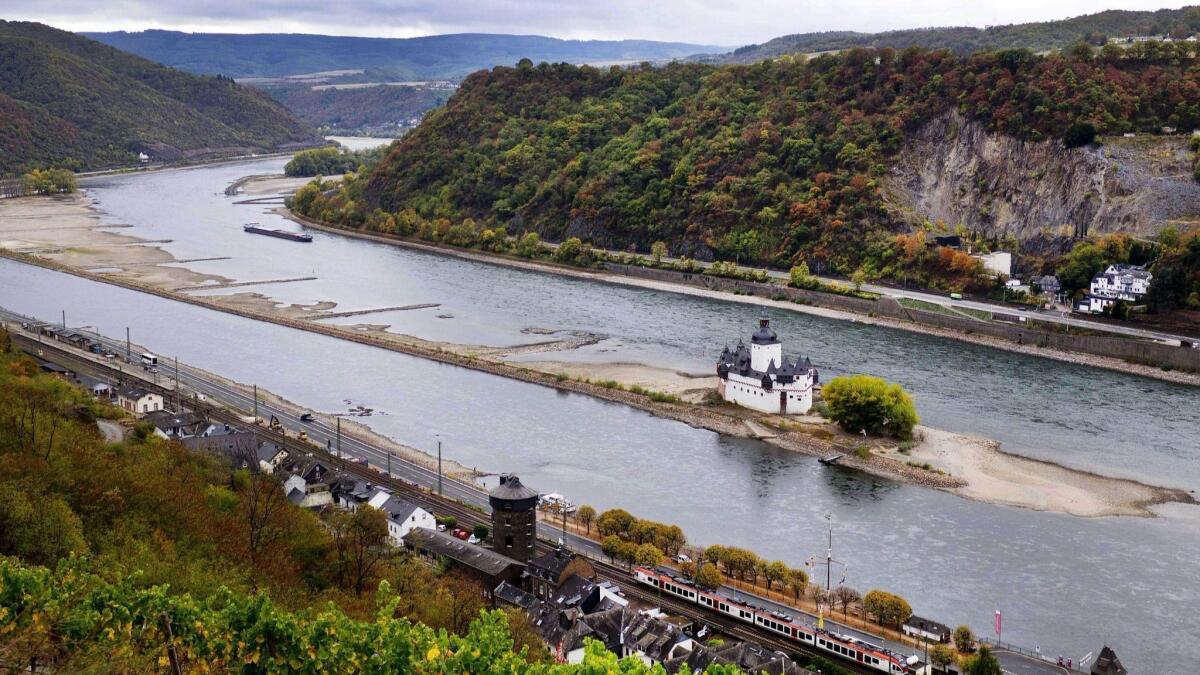Drought has hit Europe’s Rhine River and its commerce hard: ‘Everyone’s hoping for rain’

- Share via
Reporting from Cologne, Germany — The new stomping ground Cynthia Medzech and her dog Berfin discovered along the Rhine River in Germany normally rests 10 feet under water and about 200 feet from shore.
The strip of land serves as a perfect springboard for the 3-year-old Turkish shepherd as she leaps in and out of the dwindling river. But it also evokes myriad concerns about disruptions caused by record-breaking low water levels on one of Europe’s most important inland waterways.
“It’s great for us because we’ve now got all this new space to play around in,” Medzech, 23, said during a recent walk. “It’s not good for the cargo barges that can’t sail anymore.”
A prolonged dry spell across Germany and Central Europe that began with record-breaking summer heat wave and extended through what is usually a rainy autumn season has reduced the depth, volume and width of the 765-mile-long Rhine to levels that are precarious for ships and commerce.
Other rivers in Central Europe such as the Danube, Elbe and Spree have suffered as well but none carry as many ships and commerce as the Rhine. About 10% of all cargo in Germany, Europe’s leading economy, is transported by ship, and about 80% of those 220 million tons of shipped freight sails up and down the Rhine, according to German government figures.
The river, fed by melting glacier ice in Switzerland at its origins and 36 tributaries such as the Moselle in Germany, France, and the Netherlands along the way, on Oct. 23 recorded an all-time low water level of 26 inches in Cologne, the Rhine’s biggest city with a population of about 1 million.
That is far below the river’s average water level of 10.5 feet in Cologne and a fraction of its record high of 45 feet set in 1784.
The river’s usual width of about 1,000 feet in Cologne — in times of flooding it can swell to nearly half a mile wide in the city — is down to about 600 feet.
“It’s really scary to see the river getting narrower by the day,” said Peter Beyer, a member of Parliament from a district near the Rhine north of Cologne. “Everyone’s hoping for rain.”
Usually, it rains an average of 263 days a year in Cologne, which means the Rhine is almost always full of swift-moving water and diesel-fume-belching barges tugging their way up- and downstream.
But the shallow, slow-moving waters have idled many of the hundreds of cargo ships and pleasure boats that normally traverse the Rhine — which has been an important transportation route since the Roman Empire.

“Most of Germany’s freight shipping is concentrated on the Rhine because of historical reasons and industrial reasons — a large share of the country’s heavy industry is based along the river,” said Martyn Douglas of the Federal Environmental Agency.
Douglas said the drought was painfully showing how vulnerable the country’s supplies were to the forces of nature.
A spokesman for the German Economy Ministry said it was difficult to quantify the economic damage caused by the drought and low water levels in the Rhine, though sharply rising fuel prices tied to the problem were hurting business and consumers across the country.
The ministry last month began releasing 84,000 tons of crude oil, 180,000 tons of diesel fuel and 67,000 tons of jet fuel from its national strategic reserves to try to limit the impact of higher prices. It was only the fourth time the ministry has temporarily dipped into those emergency stockpiles in the last 40 years; Switzerland also began temporarily releasing diesel fuel from its stockpile.
“The goal is to ensure continued supplies of fuel across Germany,” the spokesman said. “There’s no shortage of oil. It’s a transportation problem.”
Aside from sharply higher shipping fees for barges to take a third or less of their usual payload or the shifting of supplies to trucks or trains, there is little that companies, consumers or government leaders can do.
The Rhine is adorned with picturesque castles and world-famous vineyards farther south as well as heavy industry to the north toward its mouth to the North Sea in Rotterdam, Netherlands.
It is a vital shipping artery for commerce with companies exporting their cars, chemical products, machinery and oversized plant equipment around the world as well as for supplies of coal and imported gas, diesel and jet fuel.
Those shipments have been delayed, stranded, canceled or partially shifted rather inefficiently to the roads or rails during the drought — one medium-sized cargo barge can carry the same payload as 150 trucks.
Many gas stations in the region have been running dry without fresh supplies from Rhine cargo ships and winter home heating fuel deliveries have been curtailed or postponed. Some airlines operating from farther south in Frankfurt have grown concerned about their supplies of jet fuel.
Most cruise ship operators in Cologne decided to shut down a few weeks earlier than usual this autumn rather than risk running aground or into a submerged obstacle in the treacherously shallow waters. Items including unexploded World War II-era aerial bombs and other ordnance as well as rusting car wrecks have been found in the increasingly exposed riverbed. Scores of abandoned bicycles, tons of metallic objects and trash and even a still-locked safe have been recovered as the waters retreated.
“It’s amazing to see all the junk that ends up in the river,” said Thomas Herzog, the captain of the Rheinland pleasure boat, who was trying to take advantage of the slowdown to do repair work and maintenance on his boat.
Herzog, whose 120-foot-long boat carries up to 250 passengers for hours-long cruises on weekends, said he enjoys the challenges of low water levels because it forces the mind to concentrate.
“If you’re not careful you can run into the rocks and tear a hole in the hull or get stuck on a sandbar,” the 49-year-old Cologne native said, proud that he’s never had such a shipwreck even though he has seen several over the years. “It’s more of a problem for the cargo ships than it is for me. Even when my boat is full, it’s hardly any lower in the water.”
There was an eerie calm on a river that is usually bustling with barges filled with coal, gas, chemicals and agricultural goods.
There seemed to be more one- and two-person kayaks than usual paddling out in the middle of the river recently, apparently taking advantage of the abnormal absence of the giant barges that can run up to 600 feet and carry up to 6,000 tons of freight.
“It feels weird not to see any barges out there because you get the feeling there’s something wrong,” said Laura Schmees, 33, as she walked alongside the river Tuesday. “It makes you think about climate change possibly being a cause for the lack of rain and low water, and that makes me uneasy about the future. Things seem to be out of balance. It’s scary.”
The few barges on the river are riding higher than usual as they are only partially filled with cargo. One long coal barge heading south that passed beneath one of the seven bridges in Cologne on Wednesday was mostly empty, its unused decks glistening in the midday sun.
Many of the ferries that connect the east and west sides of the Rhine have also canceled service.
“There is a silver lining, though,” said Uwe Henning, 59, who was strolling on a wide meadow near the river that serves as a floodplain a few months each year. “The air around here and the river itself are a lot cleaner without all these smelly barges out there.”
Kirschbaum is a special correspondent.
More to Read
Sign up for Essential California
The most important California stories and recommendations in your inbox every morning.
You may occasionally receive promotional content from the Los Angeles Times.












